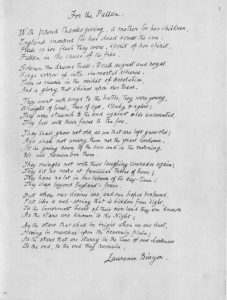The “Ode of Remembrance”, also known as simply “The Ode”, is commonly recited at remembrance services in Australia, on Anzac Day (25 April) and on Remembrance Day (11 November). Although this work was created by an English poet with no direct relationship to Australia, it has been included on this site as it is an iconic part of Australia’s military traditions.[1]
The words of the Ode of Remembrance are:
They shall grow not old, as we that are left grow old;
Age shall not weary them, nor the years condemn,
At the going down of the sun and in the morning
We will remember them.
The Ode of Remembrance is commonly recited at a ceremony, with the crowd (or listeners) participating with two formalised responses. The last line of the Ode, recited by the speaker, is normally followed by the response “We will remember them” (spoken by the listeners); following this, the speaker will intone the phrase “Lest we forget”, which is then repeated, “Lest we forget”, by the listeners.[2]

The response, “Lest we forget”, is taken from the hymn “Recessional”, written in 1897 by the British poet Rudyard Kipling (1865-1936).[4]
Reproduced here is the full text of “For the Fallen”, by Laurence Binyon, as published in The Ballarat Courier on 13 November 1914.[5]
For the Fallen
(By Laurence Binyon, in the “Times.”)
With proud thanksgiving, a mother for her children,
England mourns for her dead across the sea.
Flesh of her flesh they were, spirit of her spirit,
Fallen in the cause of the free.Solemn the drums thrill; Death august and royal
Sings sorrow up into immortal spheres,
There is music in the midst of desolation,
And a glory that shines upon our tears.They went with songs to the battle, they were young,
Straight of limb, true of eye, steady and aglow.
They were staunch to the end against odds uncounted;
They fell with their faces to the foe.They shall grow not old, as we that are left grow old;
Age shall not weary them, nor the years condemn,
At the going down of the sun and in the morning
We will remember them.They mingle not with their laughing comrades again;
They sit no more at familiar tables of home;
They have no lot in our labor of the day-time;
They sleep beyond England’s foam.But where our desires are and our hopes profound,
Felt as a well-spring that is hidden from sight,
To the innermost heart of their own land they are known
As the stars are known to the night.As the stars that shall be bright when we are dust,
Moving in marches upon the heavenly plain;
As the stars that are starry in the time of our darkness,
To the end, to the end, they remain.
See also:
Anzac Day (commemoration, 25 April)
Remembrance Day (commemoration, 11 November)
For the Fallen (sung by Jim Kokotis, 2021)
References:
[1] “Ode of Remembrance and other poems”, Anzac Portal (Department of Veterans’ Affairs)
Anita Jaensch, “The Ode of Remembrance”, Remember To Remember (Returned Services League, Australia), 26 October 2021
“Traffic stopped on Remembrance Day”, The Murrumbidgee Irrigator (Leeton, NSW), 14 November 1950, p. 2 [an example of the Ode of Remembrance being recited on Remembrance Day]
“Keen district interest in Anzac Day”, Lockhart Review (Lockhart, NSW), 1 May 1951, p. 2 [an example of the Ode of Remembrance being recited on Anzac Day]
[2] “Air Force Drill and Ceremonial Manual”, Canberra: Defence Publishing Service (Department of Defence), 2017, p. 2A-3 (291st page of the PDF file; section 13, “The Ode”)
[3] ““The Ode”: Its origins…: Author … Laurence Binyon (1869-1943)”, 3 Squadron – Australian Flying Corps / Royal Australian Air Force
“Ode of Remembrance”, Fifth Battalion The Royal Australian Regiment Association Website
“The Ode”, The Australian Army
“For the Fallen” (The Times, 21 September 1914), Wikisource
“‘For the Fallen’: Autograph copy of the poem by Robert Laurence Binyon, C.H., made for presentation to the Museum; 1938”, Europeana 1914-1918 [see the large version of “For the Fallen” in the poet’s handwriting]
“Laurence Binyon”, Wikipedia
“For the Fallen”, Wikipedia
[4] Rudyard Kipling, “Recessional”, The Argus (Melbourne, Vic.), 28 August 1897, p. 11
Rudyard Kipling, “Recessional”, The Western Star and Roma Advertiser (Roma, Qld.), 28 August 1897, p. 3
“Rudyard Kipling”, Wikipedia [Rudyard Kipling was born in India to British parents]
“Recessional (poem)”, Wikipedia
Ron Inglis, “Lest We Forget the Western Front: A Guide to Following in the Footsteps of the First AIF in Britain, Belgium and France”, Cumberland RSL Sub Branch, p. 25 [“We add to the verse the words from Kipling’s Recessional: Lest We Forget.”]
[5] “For the Fallen”, The Ballarat Courier (Ballarat, Vic.), 13 November 1914, p. 4
Updated 4 December 2023
I have written music to Laurence Binyon’s poem titled “For the Fallen” and here is the link for anyone who is interested.
Thank you for the link to your song.
It is a worthwhile addition to the Remembrance Day page.
https://www.australianculture.org/remembrance-day/